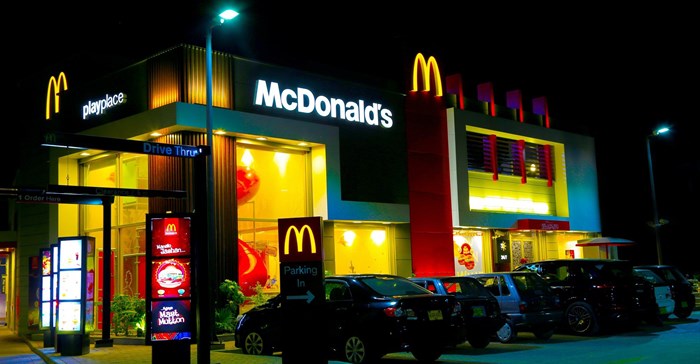McDonald's and Starbucks are among many companies caught in the crossfire of consumer boycotts over the current tragic Middle East conflicts.
Similarly, Starbucks faced boycott calls after disagreeing with a post on the social media platform X (formerly Twitter) by the chain’s union expressing solidarity with Palestine.
In both cases, customers have been voting with their feet in countries including Lebanon, Saudi Arabia, Morocco, Turkey, Jordan and Malaysia – despite franchisees expressing loyalty to the local community. There were also attacks on the two chains in the UK.
Many other American companies are being targeted. These include KFC, Pizza Hut and Burger King, as well as brands such as Coca-Cola, Pepsi.
Meanwhile, UK retailer Marks & Spencer has faced similar calls after running a Christmas commercial with a fire that was burning coloured paper-hats with unfounded allegations that it looked a bit like the Palestinian flag – the company responded that it had used red and green Xmas colours, but the commercial has since been withdrawn.
Boycotts relating to the Middle East have a long history. Twenty years ago, American brands were being removed from Arab shelves over the Iraqi invasion. Coca-Cola was boycotted by the Arab League from 1968-91 because it traded in Israel. Sometimes the activism has also come in the other direction, with Ben and Jerry’s, Orange, and SodaStream all pulling out of Israel.
More broadly, there have been boycotts over everything from the Ukraine war to “woke” branding. The logic is straightforward enough: governments will listen if you hurt their companies’ bottom line. So, in what circumstances is this effective?
Case study 1: Danish cartoons
In 2005 Danish newspaper Jyllands-Posten caused huge offence to many Muslims over cartoons satirising Prophet Muhammad. Much of the outrage was directed at the Danish government for refusing to take action, while Danish-Swedish food group Arla became a lightning rod for calls to boycott Danish products. After 40 years of building its business in the Middle East, it suffered financial and reputational loss.
Arla found it extremely difficult to stay out of the debate and faced further criticism from politicians for not explicitly supporting Denmark’s freedom of speech. Even then, it took two years for the company to reestablish itself in the Middle East.
Denmark’s economy wasn’t hurt by the broader boycott, though the newspaper did issue an apology to Muslims four months after the row began.
Case study 2: The Ukraine war
Both consumers and western companies boycotted Russia and Belarus after the Ukraine invasion in 2022. Among the companies pulling out or temporarily halting operations were McDonald’s, Starbucks, Coca-Cola, Nike, Apple, BP and Shell. The boycotts damaged the Russian economy, but clearly didn’t stop the invasion.
In fact, there are laws in place to prevent American municipalities from boycotting Israel themselves, which were upheld by the US supreme court earlier this year. There are plans to introduce a similar bill in the UK, and opponents worry it might make it harder to boycott countries like Russia in future.
Case study 3: Anti-wokeism
In 2015, Starbucks initiated a national conversation about race relations and attempting to bring different racial groups together. This attracted much criticism online for being self-serving, with people pointing out that the chain’s staff weren’t particularly ethnically diverse.
It further backfired in 2018, following an incident in a Philadelphia outlet where a member of staff got two young black men arrested for refusing to leave because they were waiting to meet someone and wouldn’t order anything. Video footage on social media significantly worsened the situation.
Many people thought it smacked of racism and called for boycotts, prompting Starbucks to publicly apologise and promise to train employees about unconscious race bias.
More recently, Bud Light faced a two-week boycott from conservatives after its “woke” campaign online featuring trans activist Dylan Mulvaney promoting a tallboy can. Sales fell 25% and Bud Light lost its position as the top-selling US beer, prompting owner InBev to try and repair the brand damage by saying it would avoid controversial subjects in future.
However, this hasn’t dissuaded companies such as Nike, Target and Disney from adopting similar pro-trans/LGBTQ strategies.
What it means for calls for Israeli boycotts
Judging by the experiences of Denmark and Russia, brand boycotts appear to exert minimal influence on the target nation’s economy. The Russia case suggests they are most likely to succeed as part of coordinated sanctions, though on that occasion the boycott was still undermined as European businesses and third countries found ways to get around it.
The best solution is for the international community to implement a system penalising such activities, which hasn’t existed with Russia. In the absence of coordinated sanctions, social media is likely to be the sole means of pressuring companies and governments into change.
Western brands have been noticeably quiet on the humanitarian crisis in the Middle East (and also Ukraine), in contrast to their willingness to risk supporting anti-racism and LGBTQ+.
Some may find this disappointing, though of course, the examples of Starbucks and Bud Light show how companies can end up in trouble if their stance is seen as inauthentic or “woke-washing”.
In sum, the boycotts against American companies have succeeded in raising awareness, but probably won’t have a huge economic impact.

This article is republished from The Conversation under a Creative Commons license. Read the original article.












































